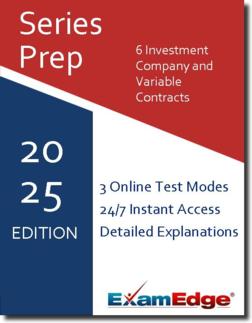Series 6 Investment Company and Variable Contracts (Series6 ) Practice Tests & Test Prep by Exam Edge - Topics
Based on 22 Reviews
- Real Exam Simulation: Timed questions and matching content build comfort for your Series 6 Investment Company and Variable Contracts test day.
- Instant, 24/7 Access: Web-based Series 6 Invest Company Variable Contracts Exam practice exams with no software needed.
- Clear Explanations: Step-by-step answers and explanations for your Series exam to strengthen understanding.
- Boosted Confidence: Reduces anxiety and improves test-taking skills to ace your Series 6 Invest Company Variable Contracts Exam (Series6 ).

Understanding the exact breakdown of the Series 6 Invest Company Variable Contracts Exam test will help you know what to expect and how to most effectively prepare. The Series 6 Invest Company Variable Contracts Exam has multiple-choice questions The exam will be broken down into the sections below:
| Series 6 Invest Company Variable Contracts Exam Exam Blueprint | ||
|---|---|---|
| Domain Name | % | Number of Questions |
| Regulatory fundamentals and business development | 22% | 22 |
| Evaluates customers’ financial information, identifies investment objectives, provides information on investment products, and makes suitable recommendations | 47% | 47 |
| Opens, maintains, transfers and closes accounts and retains appropriate account records | 21% | 21 |
| Obtains, verifies, and confirms customer purchase and sale instructions | 10% | 10 |


